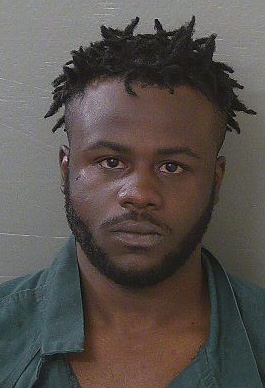Photos: Easter Bunny Visits The Molino Branch Library
March 29, 2018
The Easter Bunny stopped in Molino this week for a pajama story time and photos at the Molino Branch Library.
For a photo gallery, click here.
Photos courtesy WFPL for NorthEscambia.com, click to enlarge.
Cantonment Pedestrian Hit And Killed On East Kingsfield Road
March 28, 2018
A pedestrian was hit and killed Tuesday night on East Kingsfield Road near Majestic Drive.
Jason Strother, age 34 of Cantonment, was walking eastbound on East Kingsfileld was he was struck by a 2003 Dodge Charger driven by 41-year old Patrick Bell of Cantonment about 9:15 p.m., according to the Florida Highway Patrol.
Strother was pronounced deceased at the scene; Bell was not injured.
Any charges in the crash are pending the outcome of a traffic homicide investigation, according to the FHP.
Photos courtesy Al Showers, WEAR 3 for NorthEscambia.com, click to enlarge.
ECSO: Cantonment Man Involved As Guns Sold To Undercover Cops At Carver Park
March 28, 2018
A Cantonment man was arrested recently on weapons charges.
 In March 2017, Anthony Purifoy was allegedly involved in the sale of two firearms to undercover officers at Carver Park on Webb Street in Cantonment, according to an arrest report.
In March 2017, Anthony Purifoy was allegedly involved in the sale of two firearms to undercover officers at Carver Park on Webb Street in Cantonment, according to an arrest report.
Investigators from the Escambia County Sheriff’s Office Gun Crimes Response Team and ATF reported purchasing a Hi-Point 9mm and a Mossberg .22 caliber semiautomatic rifle for $850 in cash. A records check after the transaction did not indicate the guns were stolen.
A warrant was issued for Purifoy’s arrest. As deputies attempted to apprehend him recently, he ran from a house on Robinson Street and refused to stop, the report states. As he ran across Robinson street, he was apprehended by an Escambia County Sheriff’s Office K-9.
Purifoy was transported by Escambia County EMS to Baptist Hospital for treatment of his injuries.
Purify was arrested on two counts of possession of a weapon by a convicted felon and resist officer without violence. He remained in the Escambia County Jail without bond.
Bratt Elementary Names Students Of The Month
March 28, 2018
The following students were named Students of the Month for March at Bratt Elementary School.
Pre-K
Ariel Alexander
Patton Amos
Kindergarten
Riverly Heathcock
Abigail Hawthorne
Mason Garvin
Tikiya Syria
Aric Rolin
First Grade
Maybree Johnson
Layla Pettway
Briley Moore
Addison Carpenter
Second Grade
Jackson Salter
Isabella Sanspree
Anthoney Johnson
Bryson Odom
Third Grade
Kaylee Long
Lori Hall
John Griffs
Fourth Grade
Ora Bryan
Nevaeh Bush
Kenslee Chavira
Talaysha Curry
Fifth Grade
Cole Hughes
Jayla Brown
JayCee Vernon
Arieyana Johnson
Photo for NorthEscambia.com, click to enlarge.
Judge Orders New System Of Restoring Felon Rights
March 28, 2018
A federal judge permanently blocked Florida’s “fatally flawed” process of restoring voting rights, giving Gov. Rick Scott and the Board of Executive Clemency a month to come up with a new system of providing ex-felons the right to vote.
In Tuesday’s order, U.S. District Judge Mark Walker repeatedly chided Scott and the state clemency board — comprised of Scott, Attorney General Pam Bondi, state Chief Financial Officer Jimmy Patronis and Agriculture Commissioner Adam Putnam — for the current restoration process and for threatening to scrap the system altogether after the judge last month struck down the process as unconstitutional.
 Walker, siding with the voting-rights group Fair Elections Legal Network, last month found that the state’s clemency system is arbitrary and violated First Amendment rights and equal-protection rights under the U.S. Constitution’s 14th Amendment.
Walker, siding with the voting-rights group Fair Elections Legal Network, last month found that the state’s clemency system is arbitrary and violated First Amendment rights and equal-protection rights under the U.S. Constitution’s 14th Amendment.
In his Feb. 1 order, Walker asked both sides to propose a new method to restore voting rights to ex-felons, who now must wait five or seven years after their sentences are complete to apply to have their rights restored in a process Walker said gives “unfettered discretion” to the board.
In a brief filed last month, attorneys for the state argued that Florida could permanently do away with the restoration of civil rights, sparking a rebuke from Walker in Tuesday’s order.
“This court is not the Vote-Restoration Czar. It does not pick and choose who may receive the right to vote and who may not,” Walker began Tuesday’s 22-page order.
Walker accused the state of choosing to “essentially repackage the current scheme” that would allow Scott and the clemency board “to do, as the governor described, ‘whatever we want’ in denying voting rights to hundreds of thousands of their constituents.”
“This will not do,” Walker wrote.
On the other side, the plaintiffs asked Walker to restore the right to vote to former felons who had completed their sentences and had already gone through a five- or seven-year waiting period.
“But such relief is beyond the scope of this court’s authority,” Walker wrote, adding that “any perceived policy weaknesses” regarding the restoration of voting rights can be cured through ballot initiatives or legislative acts.
While Walker did not lay out a new process or establish new time limits, the judge ordered the board to move forward with time constraints “that are meaningful, specific, and expeditious.”
“Absent extraordinary circumstances, this court cannot conceive of any reason why an applicant at any point must wait more than one election cycle after she becomes eligible to apply for restoration,” the judge wrote.
Scott was instrumental in establishing the more onerous restoration-of-rights process almost immediately after he took office in 2011.
Scott spokesman John Tupps said Tuesday it is up to “officials elected by Floridians, not judges … to determine Florida’s clemency process for convicted felons.”
“This is outlined in Florida’s Constitution and has been in place for more than a century and under multiple gubernatorial administrations,” Tupps said in a statement. “The governor continues to stand with victims of crime. He believes that people who have been convicted of felony offenses including crimes like murder, violence against children and domestic violence, should demonstrate that they can live a life free of crime while being accountable to our communities.”
Walker’s order found that the restoration-of-rights portion of Florida’s Constitution, along with the executive clemency rights-restoration process, run afoul of the U.S. Constitution.
Relying on a footnoted quote from legendary screen character Rocky Balboa, Walker mocked the defendants, writing that they claimed “the current scheme is all sunshine and rainbows.”
And Walker invoked history as a lesson in the significance of “free association and free expression to choose public officials” to represent people and advance public policy.
“These interests are why Americans launched a revolution against perceived unfettered discretion in the hands of one high-ranking official, King George III,” Walker wrote.
Walker also cautioned that there is a risk that the clemency board “may engage in viewpoint discrimination through seemingly neutral rationales” such as traffic citations or a “perceived lack of remorse” that “serve as impermissible” masks for censorship.
“Therefore, the board must promulgate specific standards and neutral criteria to direct its decision-making,” Walker ordered.
The standards and criteria “cannot be merely advisory, a Potemkin village for anyone closely reviewing the scheme,” the judge elaborated, instructing the board not to rely “on whims, passing emotions or perceptions.”
“Establishing safeguards against viewpoint discrimination should be the board’s paramount goal following this order,” Walker instructed.
Scott and the clemency board “balk at injunctive relief” partly because of “a presumption of regularity,” Walker wrote.
“This argument boils down to ‘trust us — we got this,’ ” he wrote.
Walker also took note of “problems of potential abuse,” especially when clemency board members — who are statewide elected officials and who may be running for re-election or another office — “have a personal stake in shaping the electorate to their perceived benefit.”
“Speech is an essential mechanism of democracy, for it is the means to hold officials accountable to the people,” Walker wrote, quoting from a seminal U.S. Supreme Court decision in a case known as Citizens United v. Federal Election Commission.
“Florida’s current scheme inverts that important democratic mechanism. It cannot do so anymore,” the judge wrote.
Walker ordered the clemency board to devise a constitutionally sound program with “specific, neutral criteria that excise the risk — and, of course, the actual practice of — any impermissible discrimination, such as race, gender, religion or viewpoint.”
Walker did not specify any particular process or criteria, but ordered that “Florida’s corrected scheme cannot be byzantine or burdensome.”
Walker also rejected arguments that the clemency board can’t handle what could be hundreds of thousands of applications for rights restoration.
“It is no excuse that the board lacks resources to abide by the federal Constitution’s requirements. If the board pursues policies that sever hundreds of thousands of Floridians from the franchise and, at the appropriate time, hundreds of thousands of Floridians want their voting rights back, the board must shoulder the burden of its policies’ consequences,” Walker wrote. “They cannot continue to shrug off restoration applications indefinitely.”
Walker also chastised Scott and the board for threatening to put an end to the rights-restoration process.
Even though he found that the state’s “arbitrary slow drip” of restoring rights violates the U.S. Constitution, “that does not mean defendants can shut off the spigot of voting rights with a wrench, yank it from the plumbing, and throw the whole apparatus into the Gulf of Mexico,” Walker wrote.
“Having lost their ability to re-enfranchise citizens at a snail’s pace guided by absolutely nothing, Defendants threats to arbitrarily and completely end the vote-restoration scheme is tantamount to picking up one’s marbles and going home,” he scolded.
by Dara Kam, The News Service of Florida
Free Beans And Rice Giveaway Saturday In Cantonment
March 28, 2018
 Saint Monica’s Episcopal Church, will be distributing free rice and dried beans and other non-perishables on Saturday, March 31 from 9 until 11 a.m. (or while supplies last) at the church located at 699 South Hwy 95-A in Cantonment.
Saint Monica’s Episcopal Church, will be distributing free rice and dried beans and other non-perishables on Saturday, March 31 from 9 until 11 a.m. (or while supplies last) at the church located at 699 South Hwy 95-A in Cantonment.
There are no guidelines and no paperwork required.
Florida Superintendents Say Money May Not Cover Resource Officers
March 28, 2018
A new report from Florida’s school superintendents warns that despite a nearly $100 million increase in funding, there may not be enough money to post an armed school resource officer at each school in the state.
In reacting to the shooting deaths of 17 students and staff members at Marjory Stoneman Douglas High School on Feb. 14, the Legislature passed a new budget and related bills that boosted funding for resource officers by $97.5 million to $162 million in the upcoming academic year.
But a report from the Florida Association of District School Superintendents said school districts might not be able to meet the goal of posting at least one safety officer at each of Florida’s more than 3,500 elementary, middle and high schools. The report was part of a State Board of Education agenda for a meeting Tuesday in LaBelle but was not discussed.
“We appreciate the legislative appropriations, but many districts will have difficulty meeting the requirement to establish or assign one (or) more safe-school officers at each school facility,” the report said.
The superintendents also said a lack of funding for law-enforcement officers may put pressure on districts to use the “Coach Aaron Feis Guardian Program,” which would allow school employees, including some teachers, to bring guns to school if they are specially trained and deputized by sheriffs.
But noting the opposition to the guardian program in many districts and communities, the superintendents said much of the $67 million for that initiative may go unspent. They asked the Board of Education for support in shifting some of those funds to the school resource officer program.
“Superintendents request that you support and recommend that these unspent dollars be used in districts for additional school resource officers or other school safety measures,” the report said.
In a recent interview with The News Service of Florida, Senate President Joe Negron, R-Stuart, said lawmakers may considering using the Joint Legislative Budget Commission to shift some of the guardian funds into other safety measures if the money goes unspent, although it was too early to make that determination.
The superintendents also raised concerns about a provision in the new school-safety law that will require “active shooter” and “hostage situations” drills in the schools.
“Superintendents support these drills, but they must be accomplished with minimal disruption to teaching and learning and in a manner that does not unnecessarily frighten students, particularly elementary students,” the report said.
The superintendents said they would work with the Department of Education on other school-safety initiatives, including establishing a state Safe Schools Office, developing a school security-risk assessment tool and implementing the guardian program.
The report also offered some recommendations on implementing a new $69 million mental-health services program, which has been a top priority for the school superintendents for some time.
But the report warned that some school districts could face budget cuts in the coming year because the bulk of increased spending in the new education budget is targeted toward the school safety and mental health issues in the wake of the Broward County shooting.
The superintendents noted that the “base student allocation,” the primary source for general operational activities, only increased by 47 cents per student statewide, a fraction of the overall funding increase of $101.50 per student.
“With only a 47-cent increase in the BSA, superintendents will be forced to cut their budgets — cuts that will impact students, schools and communities that are served,” the report said.
by Lloyd Dunkelberger, The News Service of Florida
Pine Forest Shuts Out Northview; Tate Beats Miami Beach
March 28, 2018
Tate 2, Miami Beach 1
 The Tate Aggies beat Miami Beach High School 2-1 Tuesday.
The Tate Aggies beat Miami Beach High School 2-1 Tuesday.
Cole Fryman earned the victory on the pitcher’s mound for the Aggies. He allowed just one run on four hits, walking one and striking out one.
For Tate: Blake Anderson 1-2; Ryan Green 1-3, R; Reid Halfacre 1-3, RBI; Trent Jeffcoat 1-2; Raymond Lafleur 1-3; Hunter Riggan 1-2, R; Jesse Sherill 1-3, R.
Pine Forest 11, Northview 0
The Pine Forest Eagles defeated the Northview Chiefs Tuesday afternoon at Pine Forest.
After a scoreless first inning, the 6A Eagles exploded with nine runs and sealed the win in just three innings with two runs in the bottom of the third to invoke the 10-run rule.
Singleton took the loss for the 1A Chiefs surrendering 11 runs on 12 hits while striking out two. Nolan Rigby earned the win for Pine Forest with no run, three hits and striking out two.
For Northview: Seth Killam 1-3; Trevor Singleton 1-3; John Chivington 1-3; Jason Fischer 1-2.
For Pine Forest: John Pinette 1-4, R; Kyler Hultgren 1-2, 2R; Jason Roberts 3-3, R, 2RBI; Nolan Rigby 2-3, 2R, RBI; Garrett Holmes 1-3, R, RBI; Timmy Williams 3-3, 2R, RBI; Christian Munoz 1-2, RBI; Wyatt Gill 1-3, R, RBI; Ladarius Clardy 1-3, R, RBI.
Pine Forest will host South Warren of Bowling Green, KY, on April 2 at 7 p.m. The Chiefs will travel to Jay on April 3 at 6:30 p.m.
Florida Seeks Changes In Medicaid Program
March 28, 2018
For the third time in less than a year, Florida is asking the federal government to amend a sweeping Medicaid “waiver,” including seeking permission to add community mental-health providers to the list of those able to participate in a supplemental Medicaid funding program.
“We think this is a great thing to do,” said Melanie Brown-Woofter, interim president and CEO of the Florida Council for Community Mental Health. She noted that, if approved, the change could result in a projected $15.7 million increase in funding for community receiving facilities that treat patients for mental-health and substance-abuse disorders, including opioid addictions.
But under federal law, the state can’t submit proposed amendments without first allowing the public to comment. To that end, state Agency for Health Care Administration officials are holding a meeting at 3:30 p.m. Wednesday at the agency’s Tampa office.
Along with the change dealing with funding for mental-health providers, the state also wants permission to trim from 90 to 30 the number of days that Medicaid will retroactively cover beneficiaries’ health-care bills before they become eligible for Medicaid. Florida wants that change — which would only impact non-pregnant women 21 and older — to become effective July 1. If approved, the state would save about $38 million in general-revenue dollars and $98.4 million in combined state and federal funds.
Florida also is seeking to modify an existing policy on hospital ownership to recognize health-care facilities with regional perinatal care centers to tap into supplemental funds. The change would benefit Bayfront Health in St. Petersburg.
The supplemental funding issues deal with the Low Income Pool program, which provides additional funds to hospitals that serve large numbers of poor and uninsured patients. The program is comprised of funds from Florida and the federal government. But Florida doesn’t use state tax dollars for its required match. Instead, the state calls on local governments and local health-care taxing districts to provide “intergovernmental transfers” to fund the program.
Florida lawmakers agreed to direct $19.8 million in the coming year toward community central receiving systems, with a requirement of 50 percent local match, or about $10 million, Brown-Woofter told the News Service of Florida.
If the federal government approves the proposed changes, she said, the $10 million in local match could draw down another $15.7 million in so-called LIP funding. Brown-Woofter said the increased funding could either be used to enhance treatment services or to increase the number of community central receiving systems in the state.
Rules surrounding LIP funding have changed in recent years, making it less lucrative for hospitals to participate, and the state hasn’t been able to collect enough local match money to fully fund the program.
The Trump administration last year authorized a $1.5 billion LIP program when it approved what is known as Florida’s Medicaid “1115 waiver,” but the state only collected enough money from counties for a $730.6 million program this year.
Brown-Woofter said she spoke with hospital groups before lobbying the Legislature about community receiving facilities being made eligible for LIP money.
“They said go for it,” Brown-Woofter told the News Service.
The Trump Administration in August 2017 extended the waiver through June 30, 2022. The waiver allows the state to run its mandatory Medicaid managed-care program, as well as the Low Income Pool.
Before the final waiver was approved, the Agency or Health Care Administration had already submitted an amendment requesting it be altered to require people with cystic fibrosis and brain and spinal cord injuries to enroll in the Medicaid managed care program. A second amendment was submitted in September to require people with AIDS to enroll in the mandatory managed-care program.
Prior to the waiver, the state cared for those people through smaller Medicaid waiver programs.
In addition to the Tampa meeting, state Medicaid officials will hold a meeting April 3 in Tallahassee. Moreover, the state has been soliciting public input on the proposed changes since March 21.
As of Tuesday, AHCA spokeswoman Shelisha Coleman said the state had received 45 comments from the public regarding the proposed changes.
by Christine Sexton, The News Service of Florida
Man Charged With Theft Of $30K Bobcat From Molino Business
March 27, 2018
A Molino man has been arrested for allegedly stealing a Bobcat loader from a Molino feed store during the long New Year’s weekend.
 Rex Burton Hassell, 57, was charged with burglary of an unoccupied structure, felony larceny and criminal mischief with property damage.
Rex Burton Hassell, 57, was charged with burglary of an unoccupied structure, felony larceny and criminal mischief with property damage.
According to an arrest report, Hassell broke into H&H Feed on Highway 97 sometime between December 30 and January 3 and stole a Bobcat T300 skid steer worth $30,000 from inside a locked warehouse. The business owners reported that their power meter was removed from the service box during the early morning hours of December 30.
On January 22, the Bobcat was located less than 5 miles away near a pond in a wooded area off Brickyard Road in Molino. It been wrapped in a tarp and covered with vegetation.
Pictured: The Escambia County Sheriff’s Office investigates after a stolen Bobcat was recovered in a wooded area in Molino on January 22. Pictured inset and first photo below: The Bobcat was concealed with a tarp and vegetation. The Bobcat is hidden in the left of the photo below. Pictured bottom photos: The Escambia County Sheriff’s Office investigated the theft on January 3. Photos for NorthEscambia.com, click to enlarge.












